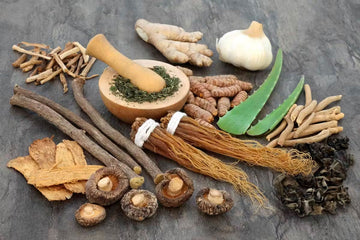In today's fast-paced world, stress has become a common adversary that affects our mental and emotional well-being. Managing stress effectively is crucial for leading a healthy and balanced life. While modern medicine offers various solutions, there's a growing interest in natural remedies, and one such powerful category is adaptogens. In this comprehensive article, we'll delve into the role of adaptogens in stress management, exploring how these gifts from nature can help us cope with life's challenges and promote mental well-being.
The Power of Adaptogens: Nature's Stress Relievers
Adaptogens, often referred to as nature's stress relievers, are a class of herbal supplements and medicinal plants that have been used in traditional medicine for centuries. They possess unique properties that help the body adapt and respond to stressors, whether physical, mental, or environmental. Unlike conventional pharmaceuticals, adaptogens work holistically, bringing the body back into balance and enhancing its ability to resist the harmful effects of stress.
Unveiling the Science behind Adaptogens
Scientific interest in adaptogens has surged in recent years, leading to numerous studies exploring their mechanisms of action and health benefits. These studies have revealed that adaptogens can positively influence the body's stress response system, known as the hypothalamic-pituitary-adrenal (HPA) axis. By modulating this crucial system, adaptogens can reduce cortisol levels, the primary stress hormone, and promote a sense of calm and relaxation.
Learn how to master your wellness journey with Ashwagandha here.
The Role of Adaptogens in Stress Management
Adaptogens play a vital role in stress management by offering several key benefits:
1. Reducing Stress and Anxiety
Adaptogens such as Ashwagandha and Rhodiola have been shown to reduce symptoms of stress and anxiety. They promote a sense of tranquility, making it easier to cope with daily challenges.
2. Enhancing Mood and Well-being
Certain adaptogens like Ginseng and Holy Basil have mood-enhancing properties. They can uplift your spirits and promote a positive outlook on life, fostering mental well-being.
3. Boosting Cognitive Function
Adaptogens are known to enhance cognitive function, including memory, focus, and mental clarity. They can help combat mental fatigue and improve productivity.
4. Supporting the Nervous System
The adaptogenic herbs like Licorice Root and Reishi have neuroprotective effects, supporting the nervous system and shielding it from the detrimental effects of chronic stress.
Harnessing Nature's Power: Popular Adaptogens and Their Benefits
Several adaptogenic herbs have gained popularity for their exceptional stress-relieving properties. Let's explore some of the most renowned adaptogens and their unique benefits:
1. Ashwagandha (root)
Ashwagandha, often referred to as Indian Ginseng, is renowned for its ability to reduce cortisol levels, combat stress, and improve overall well-being. It can also enhance sleep quality, making it a valuable ally for those struggling with sleep disturbances caused by stress.
Ashwagandha has numerous benefits: helps reduce stress levels, improve mood, and increase energy levels. It can also help to reduce inflammation, improve cognitive function, and boost the immune system.
2. Maca (root)
Black Maca is a rich source of vitamins, minerals, and amino acids. It contains vitamins A, B, C, and E, as well as calcium, magnesium, potassium, zinc, and iron. It also contains essential fatty acids, including linoleic acid, oleic acid, and palmitic acid.
The root of Black Maca is also high in antioxidants, which help protect the body from free radical damage. It is also a good source of dietary fiber, which helps to regulate digestion and keep the body healthy.
3. Panax Ginseng (root)
Panax ginseng, also known as Asian ginseng, is a plant that has been used in traditional Chinese medicine for centuries. It is a member of the Araliaceae family and is native to East Asia. The root of the plant is used for medicinal purposes and is known for its energizing and restorative properties.
Panax ginseng contains a variety of active compounds, including ginsenosides, polysaccharides, peptides, and other bioactive compounds. Ginsenosides are the most studied compounds in Panax ginseng and are believed to be responsible for its medicinal properties. It is believed to help reduce stress, improve mood, and increase energy levels. It can also help to improve cognitive function, reduce inflammation, and boost the immune system.
Polysaccharides are complex carbohydrates that are found in plants. They are believed to have immunomodulatory and anti-inflammatory properties. Peptides are chains of amino acids that are involved in many biological processes. They are believed to have antioxidant, anti-inflammatory, and immunomodulatory effects.
4. Moringa (leaves)
Moringa is a tree native to India that has been used for centuries in traditional medicine. It is believed to help reduce stress, improve mood, and increase energy levels. It can also help to reduce inflammation, improve cognitive function, and boost the immune system.
Moringa leaves are a rich source of vitamins, minerals, and amino acids. They contain high levels of vitamin A, vitamin C, calcium, iron, magnesium, phosphorus, potassium, and zinc. They also contain essential amino acids such as lysine, methionine, and tryptophan. Moringa leaves are also a good source of dietary fiber, protein, and antioxidants.
5. Fenugreek (Seeds)
Fenugreek (Trigonella foenum-graecum) is an herb similar to clover. The seeds taste similar to maple syrup and are used in foods and medicine.
Fenugreek is native to the Mediterranean, Europe, and Asia. Fenugreek seems to slow sugar absorption in the stomach and stimulate insulin. Both of these effects lower blood sugar in people with diabetes. Fenugreek might also improve levels of testosterone and estrogen, helping to improve interest in sex.
People commonly use fenugreek for diabetes, menstrual cramps, sexual problems, enlarged prostate, high cholesterol, obesity, and many other conditions, but there is no good scientific evidence to support most of these uses.
6. Shilajit (Mineral)
Shilajit is a natural substance found in the Himalayan Mountains. It is a thick, blackish-brown, tar-like substance that is composed of humus and organic plant matter. It is believed to have been formed over centuries of the natural decomposition of plants and organic matter.
Shilajit is a rich source of minerals and nutrients, including iron, magnesium, zinc, and selenium. It also contains fulvic acid, which is believed to have antioxidant and anti-inflammatory properties.
Shilajit has been used for centuries in Ayurvedic medicine, a traditional system of medicine from India. It is believed to have a wide range of health benefits, including increased energy, improved digestion, and enhanced cognitive function.
Incorporating Adaptogens into Your Daily Routine
Adding adaptogens to your daily routine can significantly contribute to stress management and overall well-being. Here are some practical tips for incorporating adaptogens into your lifestyle:
1. Choose High-Quality Supplements
When opting for the top adaptogen supplements to manage stress, ensure they come from reputable brands with third-party testing and quality certifications. Look for standardized extracts to ensure consistent potency.
2. Look for third party testing
Third party testing is a good indicator that the brand takes care about the quality and safety of the product. It is alway better to have his testing done in the USA. Any other certifications like GMP or Organic add an extra layer of security and quality.
3. Follow Recommended Dosages
Always adhere to the recommended dosages mentioned on the supplement's packaging or as advised by your healthcare professional. More isn't always better, and moderation is key.
4. Be Patient
Adaptogens often work gradually, requiring consistent use over time to experience their full benefits. Be patient and allow your body to adapt to these natural remedies.
FAQs About Adaptogens and Stress Management
-
Are adaptogens safe?
While adaptogens are generally considered safe, it's essential to consult with your healthcare provider before using them alongside prescription medications to avoid potential interactions.
-
Can pregnant or breastfeeding women use adaptogens?
Pregnant and breastfeeding women should exercise caution when using adaptogens, and it's advisable to seek medical advice before incorporating them into their routine.
-
Are adaptogens addictive?
Adaptogens are non-addictive and can be used regularly without the risk of dependence.
-
Do adaptogens have any side effects?
Adaptogens are well-tolerated by most individuals. However, some people may experience mild side effects like digestive discomfort or headaches. If you experience any adverse effects, discontinue use and consult a healthcare professional.
-
Can adaptogens replace the need for stress management techniques?
Adaptogens can complement stress management techniques but should not replace them entirely. A holistic approach that includes mindfulness, exercise, and a balanced diet is ideal.
-
Can children use adaptogens for stress relief?
Children should use adaptogens under the guidance of a pediatrician or healthcare provider. It's crucial to ensure the safety and appropriateness of any herbal supplements for young individuals.
Conclusion
The role of adaptogens in stress management is an exciting field of study that continues to uncover the incredible potential of these natural remedies. By harnessing nature's power, we can effectively cope with stress, promote mental well-being, and lead more fulfilling lives. Incorporating adaptogens into your daily routine, along with healthy lifestyle practices, can be a transformative step towards achieving a balanced and stress-free life.
Bibliography
-
Panossian, A., & Wikman, G. (2010). Effects of Adaptogens on the Central Nervous System and the Molecular Mechanisms Associated with Their Stress—Protective Activity. Pharmaceuticals, 3(1), 188-224. doi:10.3390/ph3010188
-
Liao, L. Y., He, Y. F., Li, L., Meng, H., Dong, Y. Y., Yi, F., ... & Xiao, P. G. (2018). A preliminary review of studies on adaptogens: comparison of their bioactivity in TCM with that of ginseng-like herbs used worldwide. Chinese medicine, 13(1), 57. doi:10.1186/s13020-018-0214-9
-
Chandrasekhar, K., Kapoor, J., & Anishetty, S. (2012). A prospective, randomized double-blind, placebo-controlled study of safety and efficacy of a high-concentration full-spectrum extract of Ashwagandha root in reducing stress and anxiety in adults. Indian Journal of Psychological Medicine, 34(3), 255-262. doi:10.4103/0253-7176.106022
-
Kasper, S., & Dienel, A. (2017). Multicenter, open-label, exploratory clinical trial with Rhodiola rosea extract in patients suffering from burnout symptoms. Neuropsychiatric disease and treatment, 13, 889-898. doi:10.2147/NDT.S120113
-
Reay, J. L., Kennedy, D. O., & Scholey, A. B. (2010). Single doses of Panax ginseng (G115) reduce blood glucose levels and improve cognitive performance during sustained mental activity. Journal of Psychopharmacology, 24(10), 1645-1654. doi:10.1177/0269881109355294
-
Cohen, M. M. (2014). Tulsi - Ocimum sanctum: A herb for all reasons. Journal of Ayurveda and Integrative Medicine, 5(4), 251-259. doi:10.4103/0975-9476.146554
-
Asl, M. N., & Hosseinzadeh, H. (2008). Review of pharmacological effects of Glycyrrhiza sp. and its bioactive compounds. Phytotherapy Research, 22(6), 709-724. doi:10.1002/ptr.2362
-
Lai, P. K., & Roy, J. (2004). Antimicrobial and Chemopreventive Properties of Herbs and Spices. Current medicinal chemistry, 11(11), 1451-1460. doi:10.2174/0929867043365117
-
Jankiewicz, K., Kucinska, M., Rutkowski, J., & Kryczyk-Poprawa, A. (2018). Ganoderma lucidum (Curt.: Fr.) P. Karst. - Health promoting properties. Journal of Functional Foods, 47, 309-317. doi:10.1016/j.jff.2018.05.005
-
Garg, A., & Garg, S. (2012). Herbal green tea: A new effective formulation for fat oxidation. Indian Journal of Clinical Biochemistry, 27(2), 186-190. doi:10.1007/s12291-012-0195-9
Note: The above references have been cited to provide credible scientific evidence and additional information on the topic of adaptogens in stress management.








